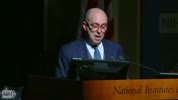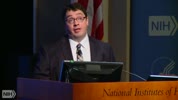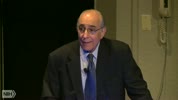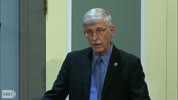-
- NIH VideoCast - Fair subject selection, community engagement and community voices
-
- - NIH Clinical Center Department of Bioethics (2015/10/10)
- - Category : Bioethics
- Ethical and Regulatory Aspects of Clinical Research
The Department of Bioethics offers this seven to eight week course annually each fall. The course is designed to provide an overview of the important issues in the ethics of human subject research for clinical investigators and others who participate in the conduct of research and is open to the entire NIH community as well as to those from outside NIH. Topics include the history of human subject research ethics, principles and guidelines, study design, subject recruitment, informed consent, and international research. The course is open to the entire NIH community as well as to those from outside NIH, and is also available through Videocast. The recommended textbook is Ethical and Regulatory Aspects of Clinical Research, edited by Emanuel et al (Johns Hopkins University Press). The course is taught by guest faculty and faculty members from the National Institutes of Health. This is a required academic program for Bioethics fellows.
NIH VideoCast - Fair subject selection, community engagement and community voices
-
- NIH VideoCast - Ethics Rounds: The Tension Between Cost and Access to Hepatitis C Treatment: A Test Case for Tomorrow`s Cures
-
- - Presenter: Steven Pearson, MD, MSc, Visiting Scientist, Bioethics Department, CC; and President, Institute for Clinical and Economic Review and Discussants: Matt Salo, Executive Director, National Association of Medicaid Directors; and Robert W. Dubois, MD, PhD, Chief Science Officer and Executive Vice President, National Pharmaceutical Council (2015/10/10)
- - Category : Clinical Center Grand Rounds
- Ethics Rounds: The Tension Between Cost and Access to Hepatitis C Treatment: A Test Case for Tomorrow`s Cures
For more information go to http://www.cc.nih.gov/about/news/grcurrent.html
NIH VideoCast - Ethics Rounds: The Tension Between Cost and Access to Hepatitis C Treatment: A Test Case for Tomorrow`s Cures
-
- NIH VideoCast - NHLBI PIs Conducting Clinical Research
-
- - Julie Eiserman, NIH (2015/10/09)
- - Category : Special
- Presentation by the Office of Human Research Protections (OHSRP) to clarify to National Heart, Lung, and Blood Institute principal investigators how to navigate the process for collaborative research involving human specimens and/or human data. Topics include collaborative research requiring IRB approval vs a determination by OHSRP.
NIH VideoCast - NHLBI PIs Conducting Clinical Research
-
- NIH VideoCast - TRACO 2015: Small Molecules - TGF Beta
-
- - A. Simeonov; S. Jakowlew (2015/10/09)
- - Category : TRACO
- Small molecules; TGF beta
For more information go to http://ccr.cancer.gov//trainee-resources-courses-workshops-traco
NIH VideoCast - TRACO 2015: Small Molecules - TGF Beta
-
- NIH VideoCast - Danger-based Immunology course, session three: Tumors
-
- - Polly Matzinger, NIH (2015/10/09)
- - Category : Special
- This is the third session of the Danger-based immunology course. We will cover immunotherapy of tumors from the 1890`s to the present, covering such things as Coley`s toxin, the need for CD4 T cell-help, Adoptive T cell therapy, anti-tumor vaccination, checkpoint blockade and tumor-mediated "suppression".
NIH VideoCast - Danger-based Immunology course, session three: Tumors
-
- NIH VideoCast - Donald A.B. Lindberg and Donald West King Lecture: Integrating multi-scale data for biomedical discovery and clinical implementation
-
- - Russell Altman, M.D., Ph.D., Standford University (2015/10/09)
- - Category : Special
- The Annual Donald A.B. Lindberg and Donald West King Lecture In Medical Informatics and/or Pathobiology
INAUGURAL LECTURERussell Altman, M.D., Ph.D.Stanford University
???Integrating multi-scale data for biomedical discovery and clinical implementation???
NIH VideoCast - Donald A.B. Lindberg and Donald West King Lecture: Integrating multi-scale data for biomedical discovery and clinical implementation
-
- NIH VideoCast - The Zebrafish Guide to Tuberculosis
-
- - Lalita Ramakrishnan, M.D., Ph.D., University of Cambridge (2015/10/09)
- - Category : WALS - Wednesday Afternoon Lectures
- We have developed the zebrafish as a surrogate model to study human tuberculosis. The optical transparency combined with the genetic tractability of this model have proved to be powerful and have allowed us to make surprising discoveries about tuberculosis pathogenesis, immunity, and drug tolerance that suggest completely new approaches to treatment. These discoveries and their application to human tuberculosis treatment will be discussed.
For more information go to https://oir.nih.gov/wals
NIH VideoCast - The Zebrafish Guide to Tuberculosis
-
- NIH VideoCast - Interfering with Interferons for Host Targeted Therapy of Bacterial Infections
-
- - Laurel L. Lenz, Ph.D., Professor of Immunology & Microbiology, University of Colorado School of Medicine (2015/10/09)
- - Category : Immunology
Immunology Interest Group
Laurel Lenz has made major contributions to our understanding of the innate and adaptive immune response to the intracellular bacterial pathogen Listeria monocytogenes. As a Ph.D. student with Mike Bevan at the University of Washington Laurel performed pioneering work on the requirements for CD8+ antigen presentation by Listeria identifying a role for the non-classical restriction element H-2-M3. Later as a postdoctoral fellow in the lab of Dan Portnoy at UC Berkeley he delved into the cell biology of the Listeria-macrophage interaction discovering a new secretory element SecA2 that influences both virulence and the induction of T cell immunity. In 2004 Laurel was recruited as a junior faculty member to the Integrated Department of Immunology at the National Jewish Health and University of Colorado School of Medicine. In 2011 he switched his primary location and affiliation to the Department of Immunology and Microbiology at the University of Colorado School of Medicine where he was promoted to Full Professor this year. In Denver, Laurel has built a broad based program investigating the regulation of macrophage, NK cell and T cell function in Listeria infection. Perhaps his most exciting contribution has been the discovery (published in J. Exp. Med.) that Type-I IFN promotes the growth of this pathogen by down-regulating IFN-gamma receptor function in infected macrophages. This fascinating antagonistic crosstalk between type I and II interferons and its implications for host-directed therapy of bacterial infections is the topic of Laurel???s IIG lecture. Laurel Lenz is a rare microbial immunologist who is equally skilled and insightful working on either side of the host-pathogen encounter. Don???t miss his exciting lecture!
NIH VideoCast - Interfering with Interferons for Host Targeted Therapy of Bacterial Infections
-
- NIH VideoCast - Towards Psychobiotics: The Microbiome as a Key Regulator of Brain and Behavior
-
- - John F. Cryan, Ph.D., University College Cork, Ireland (2015/10/08)
- - Category : National Center for Complementary and Integrative Health
- The National Center for Complementary and Integrative Health (NCCIH) presents the Integrative Medicine Research Lecture Series. The series provides overviews of the current state of research and practice involving complementary health approaches and explores perspectives on the emerging discipline of integrative medicine. John F. Cryan, Ph.D., is professor and Chair in the Department of Anatomy & Neuroscience at University College Cork in Ireland. There is a growing appreciation of the relationship between gut microbiota and the host in maintaining homeostasis in health and predisposing to disease. Bacterial colonization of the gut plays a major role in postnatal development and maturation of key systems that have the capacity to influence central nervous system (CNS) programming and signaling, including the immune and endocrine systems. Individually, these systems have been implicated in the neuropathology of many CNS disorders and collectively they form an important bidirectional pathway of communication between the microbiota and the brain in health and disease. Over the past 5 years substantial advances have been made in linking changes in microbiota to brain development and even behavior and the concept of a microbiota-gut-brain axis has emerged. In order to explore this relationship, Dr. Cryan???s team conducts studies involving animal models, early-life microbiota manipulations, and probiotic administration in adulthood. Their research has shown that gut microbiota is essential for normal stress, antidepressant, and anxiety responses. In addition, Dr. Cryan???s lab has found that microbiota is essential for social cognition and may play a role in autism-related symptomatology. In this lecture, Dr. Cryan will discuss his work as well as the concept of critical windows of time early in life when the effects of microbiota on brain and behavior appear to be more potent. Manipulation of the microbiota in early life by cesarean delivery, antibiotics, or stress leads to long-lasting effects on brain and behavior. Dr. Cryan will also discuss how specific modulation of the enteric microbiota through diet may be a useful ???psychobiotic???-based strategy for both stress-related and neurodevelopmental disorders ranging from depression to autism.
For more information go to https://nccih.nih.gov/news/events/IMlectures
NIH VideoCast - Towards Psychobiotics: The Microbiome as a Key Regulator of Brain and Behavior
-
- NIH VideoCast - Intracellular Fibroblast Growth Factors (iFGFs): Novel Regulators of Neuronal Excitability
-
- - Jeanne Nerbonne, Ph.D., Washington University School of Medicine (2015/10/06)
- - Category : Neuroscience
NIH Neuroscience Series Seminar
Dr. Nerbonne???s research is focused ondelineating the molecular, cellular and systemic mechanisms involved in thedynamic regulation of cardiac and neuronal membrane excitability. Combiningbiochemical, electrophysiological, immunohistochemical and molecular genetic approaches,the focus of their work is on characterizing the biophysical properties and thefunctional roles of the voltage-gated potassium (Kv) and sodium (Nav) ionchannels expressed in different myocardial and neuronal cell types, definingthe functional roles of these channels in shaping the waveforms of individualaction potentials and controlling repetitive and rhythmic firing, identifyingthe molecular correlates of native neuronal and myocardial Kv and Nav channels,and delineating the mechanisms controlling channel expression, distribution and functioning.
Using a variety of molecular geneticstrategies and proteomics, ongoing studies are focused on defining the roles ofKv channel accessory subunits and regulatory proteins in controlling thefunctional cell surface expression and the biophysical properties of Kvchannels in the normal heart. Similar approaches are exploited to define themolecular determinants of myocardial Nav channel expression and functioning.Additional ongoing studies are focused on exploring the molecular mechanismsunderlying Kv and Nav channel remodeling in the hypertrophied and failing heartand in other myocardial diseases associated with cardiac rhythm disturbances.
The other major goal of ongoing research in their laboratoryis to define the mechanisms that control the expression and functioning ofnative neuronal Kv and Nav channels. These channels function to controlneuronal resting membrane potentials, action potential waveforms, repetitivefiring, the responses to synaptic inputs and synaptic plasticity. In ongoingstudies, they are exploring the molecular basis of functional neuronal Kv andNav channel diversity and the mechanisms controlling the expression,trafficking, localization and biophysical properties of these channels inneurons in the cerebellum, suprachiasmatic nucleus and cerebral cortex.
NIH VideoCast - Intracellular Fibroblast Growth Factors (iFGFs): Novel Regulators of Neuronal Excitability
-
- NIH VideoCast - Principles of Clinical Pharmacology ~ Drug Absorption and Bioavailability
-
- - Dr. Juan J.L. Lertora, NIH (2015/10/03)
- - Category : Principles of Clinical Pharmacology
- The "Principles of Clinical Pharmacology" course is a weekly lecture series covering the fundamentals of clinical pharmacology as a translational scientific discipline focused on rational drug development and utilization in therapeutics. The course is offered annually at the NIH Clinical Center and runs from September through April.
NIH VideoCast - Principles of Clinical Pharmacology ~ Drug Absorption and Bioavailability
-
- NIH VideoCast - TRACO 2015: Breast Cancer - Clinical Trials
-
- - F. Zia; J. Smite (2015/10/02)
- - Category : TRACO
- Breast cancer; Clinical trials
For more information go to http://ccr.cancer.gov/trainee-resources-courses-workshops-traco
NIH VideoCast - TRACO 2015: Breast Cancer - Clinical Trials
-
- NIH VideoCast - NIH Workshop on Reproducibility in Cell Culture studies (Day 2)
-
- - NIGMS & NHGRI (2015/10/02)
- - Category : Conferences
- In recent years increasing numbers of researchers and commentators have reported difficulties in replicating others` results and/or confirming their findings. At this workshop, leading experts from academia and industry will discuss factors that impact reproducibility in cell culture studies.
NIH VideoCast - NIH Workshop on Reproducibility in Cell Culture studies (Day 2)
-
- NIH VideoCast - History and Framework for Ethical Clinical Research
-
- - NIH Clinical Center Department of Bioethics (2015/10/02)
- - Category : Bioethics
- Ethical and Regulatory Aspects of Clinical Research
The Department of Bioethics offers this seven to eight week course annually each fall. The course is designed to provide an overview of the important issues in the ethics of human subject research for clinical investigators and others who participate in the conduct of research and is open to the entire NIH community as well as to those from outside NIH. Topics include the history of human subject research ethics, principles and guidelines, study design, subject recruitment, informed consent, and international research. The course is open to the entire NIH community as well as to those from outside NIH, and is also available through Videocast. The recommended textbook is Ethical and Regulatory Aspects of Clinical Research, edited by Emanuel et al (Johns Hopkins University Press). The course is taught by guest faculty and faculty members from the National Institutes of Health. This is a required academic program for Bioethics fellows.
NIH VideoCast - History and Framework for Ethical Clinical Research
-
- NIH VideoCast - Frederick National Laboratory Advisory Committee Meeting - September 2015
-
- - NCI (2015/10/02)
- - Category : Advisory Board Meetings
- The 9th meeting of the Frederick National Laboratory Advisory Committee
NIH VideoCast - Frederick National Laboratory Advisory Committee Meeting - September 2015
-
- NIH VideoCast - 1) Lentivector Gene Therapy for X-linked Severe Combined Immune Deficiency (XSCID) in Older Children, Young Adults with Impaired Immunity 2) A New Approach to Cancer Immunotherapy Targeting Unique Cancer Mutations
-
- - Harry L. Malech, Chief, Laboratory of Host Defenses and Chief, Genetic Immunotherapy Section, NIAID, NIH and Steven A. Rosenberg, MD, PhD, Chief, Surgery Branch, NCI, NIH (2015/10/02)
- - Category : Clinical Center Grand Rounds
- Lentivector Gene Therapy for X-linked Severe Combined Immune Deficiency (XSCID) in Older Children, Young Adults with Impaired Immunity and Recurrent Infections Despite Prior Haplo-transplant
Harry L. Malech, MD Chief, Laboratory of Host Defenses and Chief, Genetic Immunotherapy Section, NIAID, NIH
A New Approach to Cancer Immunotherapy Targeting Unique Cancer Mutations
Steven A. Rosenberg, MD, PhD Chief, Surgery Branch, NCI, NIH
For more information go to http://www.cc.nih.gov/about/news/grcurrent.html
NIH VideoCast - 1) Lentivector Gene Therapy for X-linked Severe Combined Immune Deficiency (XSCID) in Older Children, Young Adults with Impaired Immunity 2) A New Approach to Cancer Immunotherapy Targeting Unique Cancer Mutations
-
- NIH VideoCast - The AML genome(s): Mutations in four dimensions
-
- - Timothy J. Ley, M.D., Washington University School of Medicine (2015/10/02)
- - Category : WALS - Wednesday Afternoon Lectures
- NIH Director???s Wednesday Afternoon Lecture Series
For many years, Dr. Ley`s laboratory has used mouse models of acute myeloid leukemia (AML) to establish key principles of AML pathogenesis. The lab established that the initiating event for Acute Promyelocytic Leukemia is the PML-RARA fusion gene created by the t(15;17) that is found in nearly all patients with this disease. The roles of cooperating mutations and the cellular milieu for APL pathogenesis have also been established. In collaboration with the Genome Institute at Washington University, the investigators of the Genomics of AML PPG (TJ Ley, PI) sequenced the first human cancer genome (a patient with AML) and the first mouse cancer genome (from the mouse model of APL), and have discovered several new recurrent mutations that are important for AML pathogenesis and outcomes, including recurring mutations in DNMT3A and IDH1/2, among many others. These data are now being correlated to RNA expression, DNA methylation, protein abundance and modification, and clinical datasets. These efforts will hopefully lead to new tests to better establish prognosis, and new approaches for the therapy of patients with this disease.
For more information go to https://oir.nih.gov/wals
NIH VideoCast - The AML genome(s): Mutations in four dimensions
-
- NIH VideoCast - Development and functional diversification of dendritic cells in immunity
-
- - Kenneth Murphy, M.D., Ph.D., Washington University in St. Louis (2015/10/02)
- - Category : Immunology
Immunology Interest Group
Among many seminal discoveries, Dr Murphy???s work provided the first demonstration in vivo of antigen-induced apoptosis in the thymus during thymocyte selection and identified mechanisms by which pathogens instruct the direction of T helper differentiation. His work also revealed the basis for TH2 stability as a result of extinction of IL-12 signaling and transcriptional auto-activation. More recently Dr. Murphy`s research addresses the regulation of immune responses with particular emphasis on dendritic cell (DC) differentiation, central to both effective defense and rheumatologic disorders. His recent discoveries include the transcriptional basis for development of distinct subsets of dendritic cells such as the CD8alpha+ cDC that promotes effective defense against intracellular pathogens and cross-presentation during viral infections, the molecular basis for the unique transcriptional activities of the BATF family involving newly recognized cooperative interactions with IRF4 and IRF8, and the identification of the DC-specific transcription factors Zbtb46 and L-Myc which are being used to interrogate the earliest steps in cellular commitment to the classical DC lineages. Dr. Murphy is an investigator of the Howard Hughes Medical Institute, received numerous awards and is the author of over 240 papers. Please join us for a seminar from one of the most original leaders of the immunology field.
NIH VideoCast - Development and functional diversification of dendritic cells in immunity
-
- NIH VideoCast - Communicating For Success
-
- - Peter Nguyen, Debra Chew, Jer Donald Get, Sandre Le, Chris Hare, Paul White, Claire Tse, Dottie Li, Elizabeth El-Natter (2015/10/01)
- - Category : Career Development/OITE
- The Federal Asian Pacific American Council (FAPAC) will be providing a one day leadership training. Topics will include: achieving excellent and career advancement; cultural integration and interpersonal communication; public speaking and professional presentations; effective networking and interviewing and effective communication through accent reduction and modification. The Director of the NIH Office of Diversity, Equality and Inclusion, Ms. Debra Chew, will open the day as the keynote speaker.
NIH VideoCast - Communicating For Success
-
- NIH VideoCast - PMI Stakeholders Briefing - September 2015
-
- - NIH OD (2015/10/01)
- - Category : Special
- In January 2015, President Obama announced the Precision Medicine Initiative (PMI) ??? an exciting new effort to accelerate our understanding of individual differences in people???s genes, environment, and lifestyle and their effect on disease onset, progression, prevention, and treatment. A major component of the PMI is the PMI Cohort Program (PMI-CP) ??? a new research cohort of a million or more volunteer participants. Dr. Francis Collins, NIH Director, and Dr. Kathy Hudson, NIH Deputy Director for Science, Outreach, and Policy, will host a briefing for stakeholders on the PMI Report and the design of the PMI-CP.
NIH VideoCast - PMI Stakeholders Briefing - September 2015






















